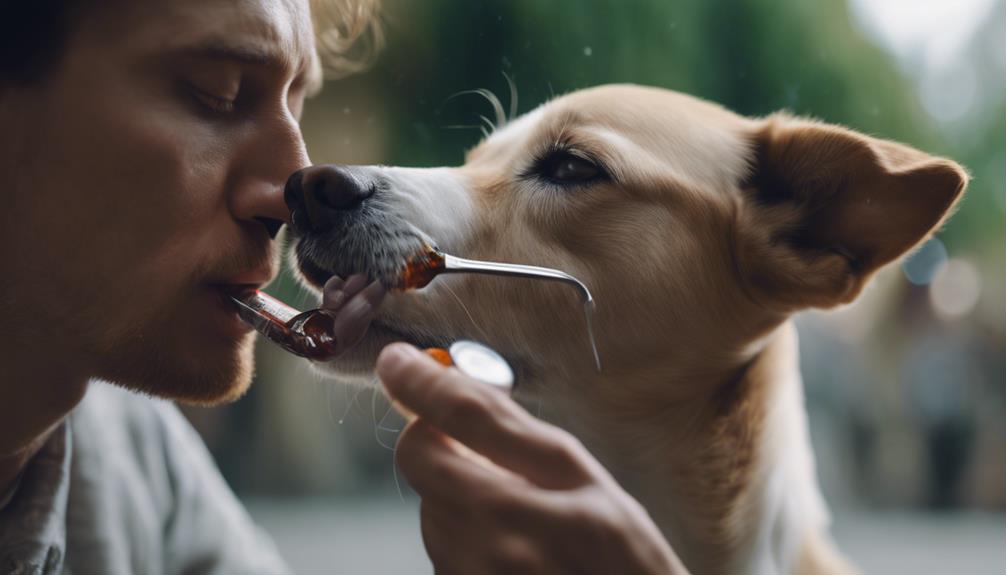When considering the use of cough medicine for dogs, the balance between relief and potential risks becomes a critical factor for pet owners.
The question of safety and appropriateness in administering cough-suppressing drugs to our canine companions warrants a closer examination.
As we navigate through the nuances of canine health and medication, the discussion surrounding when to turn to cough medicine for dogs unfolds with complexities that demand careful consideration.
The interplay between efficacy, potential side effects, and the specific conditions that warrant such interventions prompts a deeper exploration into this multifaceted topic.
Key Takeaways
- Proper diagnosis is crucial to determine safe cough medicine for dogs.
- Avoid giving human cough medicine due to xylitol poisoning risks.
- Always follow vet instructions for administering cough medicine safely.
- Effectiveness of cough suppressants in dogs varies; consult a vet for guidance.
Understanding Different Types of Cough Medicine
When considering cough medicine for dogs, a proper understanding of the different types available is essential for selecting the most appropriate treatment. Cough medicine for dogs typically falls into two categories: cough suppressants and expectorants.
It is vital to have a proper diagnosis from a veterinarian to determine the underlying cause of the cough and decide on the most suitable medication. For instance, giving a cough suppressant to a dog with pneumonia or heart disease can be harmful, while specific conditions like collapsed trachea or kennel cough may benefit from cough suppressants.
Some conditions may require specific medications like antibiotics for treating pneumonia or heart disease. Consulting a veterinarian is crucial to ensure the proper management of your dog's cough.
Risks of Using Human Cough Medicine
Utilizing human cough medicine for dogs poses inherent risks due to the potential dangers of xylitol poisoning and significant dosage variations between human and canine medications. Xylitol, a common ingredient in human cough medicines, can be life-threatening to dogs even in small amounts.
Given the differences in metabolism between humans and dogs, administering human cough medicine can lead to overdosing or ineffective treatment. Small dogs are particularly vulnerable to the adverse effects of human medications due to their size.
To ensure the safety and well-being of your pet, it is crucial to refrain from using human cough medicine and instead consult a veterinarian for appropriate and safe treatment options tailored to your dog's specific needs.
Proper Administration Methods for Dogs

Implementing appropriate methods for administering cough medicine to dogs is essential for ensuring effective treatment and the well-being of your pet.
Cough medicine for dogs can come in various forms such as pills, liquid, or injectables. Pills can be easily hidden in food or treats for convenient consumption. Liquid medications can be mixed with food or administered directly using a syringe. Injections, on the other hand, may require guidance from a veterinarian and the proper equipment.
It is crucial to strictly adhere to the dosage and administration instructions provided by the vet to guarantee the safe and accurate delivery of the medication to your furry companion.
Effectiveness of Cough Suppressants in Dogs
Exploring the effectiveness of cough suppressants in dogs involves understanding their variable nature and the importance of veterinary guidance for optimal treatment outcomes. When considering the use of cough suppressants for dogs, it's essential to be aware of the following:
- Variability in Response: Dogs may respond differently to cough suppressants, with some experiencing significant relief while others show minimal improvement.
- Underlying Conditions: The effectiveness of cough suppressants can be influenced by underlying health issues, such as pneumonia or heart disease.
- Veterinary Input: Consulting a veterinarian is crucial to determine the most suitable cough suppressant for a dog's specific condition, ensuring appropriate treatment and monitoring for any potential side effects.
Importance of Veterinary Guidance

Veterinary consultation plays a pivotal role in ensuring the safe and effective administration of cough medicine for dogs. Veterinarians have the expertise to diagnose the underlying cause of the cough accurately, which is essential in determining the appropriate treatment. They can recommend the most suitable cough suppressant or expectorant based on the specific condition affecting the dog.
Additionally, veterinarians can provide guidance on proper dosage, potential side effects, and any necessary precautions. Seeking veterinary advice before administering any medication to a dog is crucial to prevent harm and ensure the well-being of the pet. Trusting the expertise of a veterinarian can lead to a more successful treatment outcome and better overall health for the dog.
Monitoring and Seeking Veterinary Advice
Proper monitoring of a dog's response to cough medicine and promptly seeking veterinary advice are essential steps in ensuring the effectiveness and safety of the treatment. It is vital to observe any changes in your dog's condition and consult with a veterinarian if any concerns arise. Here are key points to consider:
- Monitoring Symptoms: Keep track of the frequency and severity of your dog's coughing episodes.
- Consulting the Veterinarian: Seek professional guidance if the cough persists or worsens despite medication.
- Follow-Up Visits: Schedule follow-up appointments as recommended by the veterinarian to assess the progress of the treatment plan.
Utilizing Nebulizers and Humidifiers

The use of nebulizers and humidifiers can aid in managing respiratory conditions in dogs effectively.
Nebulizers deliver medication in mist form, making it easier for dogs to inhale and benefit from the treatment directly in their airways. This method is particularly helpful for addressing conditions like asthma, bronchitis, or pneumonia.
Humidifiers, on the other hand, increase moisture in the air, which can soothe a dog's respiratory tract and ease coughing. They are beneficial in situations where dry air exacerbates coughing fits or irritates the airways.
Both nebulizers and humidifiers can be recommended by veterinarians as part of a comprehensive treatment plan to alleviate respiratory distress in dogs.
Additional Resources for Dog Health
When exploring resources to enhance the well-being of your canine companion, it is essential to educate yourself on various aspects of dog health beyond immediate treatment methods. To further your knowledge and understanding, consider the following additional resources for dog health:
- Nutrition and Diet – Learn about the importance of a balanced diet for your dog's overall health and well-being. Understand different dietary requirements based on age, breed, and any existing health conditions.
- Exercise and Mental Stimulation – Discover the significance of regular exercise and mental stimulation for keeping your dog physically fit and mentally sharp. Explore various activities and games to engage your dog's body and mind.
- Regular Veterinary Check-ups – Recognize the value of routine check-ups with your veterinarian to monitor your dog's health, detect any potential issues early, and ensure preventive care measures are in place.
Conclusion
In conclusion, the safe use of cough medicine for dogs requires a thorough understanding of different types of medications, proper administration methods, and the importance of veterinary guidance.
Pet owners should carefully consider the risks and benefits of using cough suppressants, seeking veterinary advice when needed.
By utilizing resources like nebulizers and humidifiers, pet owners can help alleviate their dogs' discomfort while ensuring their well-being is prioritized.




